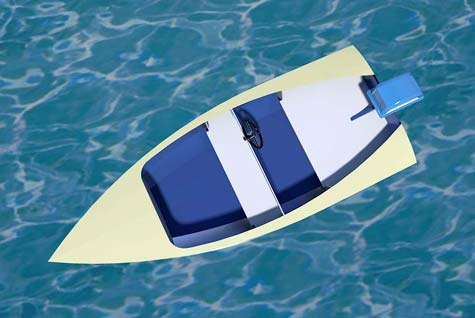Full size templates for this boat are available HERE
*Full size templates are in .pdf format. They need to be printed on a plan printing machine. Most cities have plan printing shops that can do this for you, alternatively, you may know a local architect, or engineer who could print the templates for you at a reasonable price. Click HERE for a list of templates included.
The Zipper is an 11 foot runabout based on designs of the 1950's for Class 'B' stock utility racing boats by Hal Kelly and William Jackson. This design differs from those of the period in that it is to be constructed in the 'Instant Boat' method using glass fiber and polyester or epoxy resins to make the joints.
10hp should be sufficient to see it planing at over 30 mph ........ its called 'The Zipper' because
it flies!
The plans package is in 3 parts as follows:
- The construction manual.
- The dimensioned scale plans in letter or A4 format.
You also have the option to download and print separately, the set of full size template drawings of all major components.
Anyone with a basic knowledge of woodworking should be able to make this boat. Whilst this manual sets out the construction sequence in detail, the builder should have a basic knowledge of, and ability in working with wood and polyester or epoxy resins and glass fiber.
Two excellent books on the subjects of boat building and working with polyester and epoxy resins are: Jim Michalak: 'Boatbuilding for Beginners (and Beyond)' and Harold Payson: 'Build the New Instant Boats'

| Zipper Specifications | ||
| Length | : | 11' |
| Beam | : | 4' 3" |
| Empty Hull Weight | : | 180 lbs. |
| Suggested Horsepower | : | 10 |
List of Materials:
Marine Plywood
1/4" x 4' x 8' (6mm x 1220mm x 2440mm} 3 sheets
3/8" x 4' x 8' (9mm x 1220mm x 2440mm} 2 sheets
1/2"* x 4' x 8' (6mm x 1220mm x 2440mm} 1 sheet
Timber
1-1/2" (38mm) square timber x 8' (2400mm) for the bottom skid
1-1/2" (38mm) square timber for the temporary supports, about about 40' (12.5m) 3/4" x 1-1/2" (19mm x 38mm) timber for the gunwales x 12' (3600mm) long, 2 pieces
3/4" x 1-1/2" (19mm x 38mm) timber for the coaming x 9' (2700mm) long, 2 pieces
3/4" x 1-1/2" (19mm x 38mm) timber for the seat supports & deck supports, about 40' (12.5m)
3/4" x 6" (19mm x 150mm) Timber for the temporary support rails x 9' (2700mm) long, 2 pieces

Resin and Glass
50 yard (45m) roll of 3" (75mm) glass tape 5 yards (4.5m) of 38" (1m) glass cloth to cover the bottom of the hull.
If you plan to cover the whole hull get 10 yards
(9m)
About a gallon and a half (5 litres) of polyester
or epoxy resin*
About 5 pounds (2kg) of resin thickening powder
1 sheet of 8' x 4' (1.2m x 2.4m) of Styrofoam 2" (50mm) thick.
2 sheets of 8' x 4' (1.2m x 2.4m) of Styrofoam 1" (25mm) thick.

*Po|yester or Epoxy Resin?
These days the preferred method is to work with epoxy resin, it adheres better and does a better job of keeping the water out but it costs a lot more than polyester resin.
If you plan to keep your boat on a mooring all summer then I'd recommend sheathing the whole hull in glass mat and epoxy resin. If the boat's going to be kept on a trailer then making the boat with polyester resin should offer sufficient durability.







